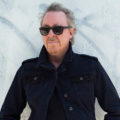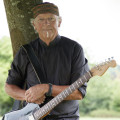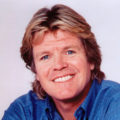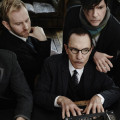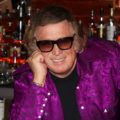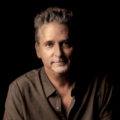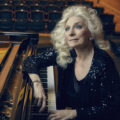On the way to Genesee via the “Ventura Highway,” Dewey Bunnell recounts a half-century of America
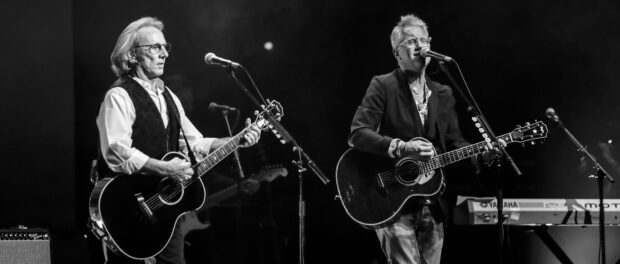 Photos provided by Christie Goodwin
Photos provided by Christie Goodwin
Better late than never when it comes to America finally getting to bring its “50th Anniversary” Tour to the Genesee Theatre, even if the acoustic pop group officially got off the ground in 1970.
In spite of all the pandemic-related delays, the band kept fans engaged with a slew of archival releases from the vaults, highlighting both the later duo days of Dewey Bunnell and Gerry Beckley, all the way back to their beginnings with the late Dan Peek.
If anything, reaching the half-century mark has shown just how much America has accomplished when it comes to writing songs that will likely live forever, whether they be “Ventura Highway,” “Sister Golden Hair,” “I Need You,” “Tin Man,” “You Can Do Magic,” and of course, “A Horse With No Name,” all of which can be heard on the “Golden Hits” collection.
Bunnell rang Chicago Concert Reviews to recount being in the saddle from day one, including a lost but not forgotten night with The Beatles’ producer George Martin, working with several alternative rock appreciators, being unexpectedly sampled by a few sibling superstars and always following their muse no matter what was in fashion.
What came to mind first when you realized it was America’s 50th anniversary?
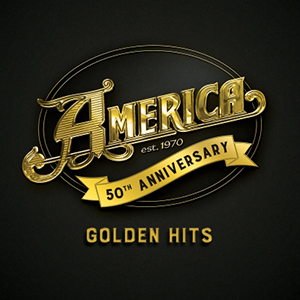 Dewey Bunnell: It’s a heck of a milestone after all these years. It feels like the last quarter century went pretty damn fast frankly, but we knew it was coming and we were planning on it. We had focused on the 50th to have some new projects out. We recorded a live show at the London Palladium in England [for a DVD], so that was a special recording. There’s a great live show that we’re working on right now from 1975 at the Hollywood Bowl in L.A. and George Martin was sort of our opening act. George conducted the Hollywood Symphony Orchestra during our set for some of the songs that he had arranged [for America] over the years on various albums, but he also opened the show with a great set of Beatles music, James Bond music and Beethoven, one of his favorite composers. It was great and we kind of unearthed that.
Dewey Bunnell: It’s a heck of a milestone after all these years. It feels like the last quarter century went pretty damn fast frankly, but we knew it was coming and we were planning on it. We had focused on the 50th to have some new projects out. We recorded a live show at the London Palladium in England [for a DVD], so that was a special recording. There’s a great live show that we’re working on right now from 1975 at the Hollywood Bowl in L.A. and George Martin was sort of our opening act. George conducted the Hollywood Symphony Orchestra during our set for some of the songs that he had arranged [for America] over the years on various albums, but he also opened the show with a great set of Beatles music, James Bond music and Beethoven, one of his favorite composers. It was great and we kind of unearthed that.
The actual concept of the 50th included unearthing a whole lot of stuff that we hadn’t looked at for decades. We found demo recordings that weren’t used, but we cleaned them up a little bit. We’ve got an archivist named Jeff Larson, who is just a wonderful guy. He’s a musician himself and he’s an archivist in the sense that he really digs deep. We gave him access to all kinds of hard drives, multi-tracks and analog things, two-tracks, and he just waded in and found all kinds of stuff [that wound up on the “Half Century” box set]. So we’ve certainly acknowledged the 50th, but we started in 1970, so we’re already in our 52nd year technically. We got a couple shows under our belts, finally, this past weekend, so we’re raring to go again. Like everything and everybody else, everything got put on hold and a couple of years have gone by.
How does this all factor into your current tour that’s coming to the Genesee Theatre?
Bunnell: Well, the live show has been distilled down for many years and decades. You have a core group of songs that we have to play regardless, all the hits of course, so a good three quarters of the show is greatest hits music. It’s a familiar, cross-section of all of our years: “Tin Man,” “Daisy Jane,” “Sandman,” “Sister Golden Hair,” “A Horse With No Name,” “Ventura Highway,” “You Can Do Magic,” “Lonely People.” There are a lot of songs that we’re really obligated to play and we love playing them, but then we do try to put in songs that are more obscure. We’ve done that every year. We trade out the obscure songs, but we have to play the core songs all the time. We have video enhancement behind us and we incorporated a little bit of 50th anniversary bits and visual things behind us. Some of the songs that are a little more stretched out have a theme. We’re very proud of this live show. We’ve been a live band for all these years and never stopped touring, so it’s really our bread and butter. We love doing it and the band is great…
What are some stand out shows from previous visits to the Chicago area?
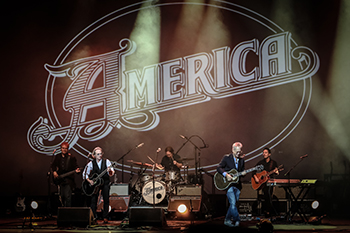 Bunnell: We’ve been playing the Chicago area from the very beginning back when we first came to the States from England. We started in England cause we were in the Air Force. That’s where we made the first album. That’s where Warner Brothers signed us. That’s where we really cut our teeth playing a lot of small venues, pubs and colleges. [We took] some trips over to Holland on the ferry to play a bunch of clubs and worked our way up to become the opening act for Cat Stevens. That was a big feather in our cap, back then in ’71, and we did a lot of one-off opening act shows for a lot of heavyweights, like The Who, Pink Floyd and Elton John. From there, when we got back to the states in ’72, we had a hit record. We thought the real touring in the U.S. was playing bigger arenas and we had to get a live band, a rhythm section and actually have a show that lived up to the recordings more.
Bunnell: We’ve been playing the Chicago area from the very beginning back when we first came to the States from England. We started in England cause we were in the Air Force. That’s where we made the first album. That’s where Warner Brothers signed us. That’s where we really cut our teeth playing a lot of small venues, pubs and colleges. [We took] some trips over to Holland on the ferry to play a bunch of clubs and worked our way up to become the opening act for Cat Stevens. That was a big feather in our cap, back then in ’71, and we did a lot of one-off opening act shows for a lot of heavyweights, like The Who, Pink Floyd and Elton John. From there, when we got back to the states in ’72, we had a hit record. We thought the real touring in the U.S. was playing bigger arenas and we had to get a live band, a rhythm section and actually have a show that lived up to the recordings more.
So we would play Ravinia, the Arie Crown Theater and a lot of shows around there. We’ve played the Genesee in Waukegan now a handful of times. To be honest, a lot of shows are a blur, literally…but we’ve always loved the Chicago area and we’ve had lots of friends over the years there. It’s hard to even piece together how many shows we’ve done over those years, but then we became the opening act for a lot of tours in the ‘80s. We opened for Kenny Loggins and Christopher Cross. We did dual package bills. We played with the band Chicago a lot. They’re good friends of ours. We’ve done a lot of tours with Chicago, and The Beach Boys and we love coming to the area.
Throughout the 1970s, America was constantly on the charts. How were you able to keep the momentum going?
Bunnell: If [only] we knew the formula! Of course, any artist will tell you that has been around, the veterans, it’s hard to keep that momentum. We were young, that’s one factor. We were excited and we had a lot of songs in our heads that we wanted to get out, [myself], Gerry and Dan Peek, our third member back then, who is another huge part of our beginnings. We were the three musketeers as a trio. We had stools with acoustic guitars, but the thing is Dan, Gerry and myself were all writers. That really was a huge pool of songs and the more prolific days when we were writing virtually daily. But there are no guarantees. Just because you’re writing original material, that doesn’t mean they’re going to be hits, obviously.
I always like to think that we represented our generation at that time. We were writing about similar emotions, and the times that were creating our lives and our lyrics. We were growing up and we were maturing. We were only 18 or 19 when we started, so we whatever level of maturity we reached at that ripe old age [was what we wrote about]. Needless to say, maturing gets stunted on the road [during a life of] music, showbiz and a lot of travel. We were very fortunate. It was timing. We had the songs that connected with listeners and we had a great run in the ‘70s and early ‘80s. It’s really hard to repeat that over and over. Times change and there are new musical eras. We’ve seen a lot in the time that we’ve been around: glam rock, disco, punk rock, new wave, heavy metal, the country pop era. It just goes on and on, and there we were chugging along as the singer/songwriters that we are. We loved acoustic guitars, vocal harmonies and lyrics. I like to write songs that are very visual. I love nature and my songs are always outdoor songs: “Ventura Highway,” “A Horse With No Name.” Gerry wrote the more indoor songs, love songs, ballads and emotional things: “I Need You,” “Daisy Jane,” “Sister Golden Hair.” If there was a formula, we’d be plugging it in every day!
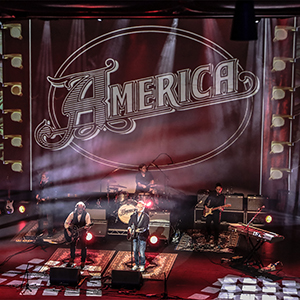 Tell us about keeping up with changing tides throughout the ‘80s and pressing onward.
Tell us about keeping up with changing tides throughout the ‘80s and pressing onward.
Bunnell: Then we had a comeback, if you will, in ’82 with the song “You Can Do Magic,” which we did not write. We did the first three albums ourselves, produced those mostly and wrote everything. Then George Martin came on board to produce from ’74 to about ’79 or ’80. We did seven total albums, including the “Greatest Hits” he mixed, and then things kind of plateaued. Things had changed going into the ‘80s and we decided the one thing we couldn’t change was ourselves. We couldn’t get another producer or another bandmate, so we decided to look for outside material and our manager at the time put us in touch with Russ Ballard, who wrote Santana’s song “Winning” and a lot of great songs. He wrote “Magic” specifically for us. He tailored it for our vocals, and acoustic guitars and we love the song. It kind of jolted us back into the limelight. We did another album with him, [1983’s “Your Move”]. I co-wrote a song with him called “The Border” and that did relatively well. Those were really our last big charted records to be honest.
From that point, we kept making records, but we just couldn’t get any traction. We had seven years with Warner Brothers and eight years on Capitol Records. That was 15 years right there. Then the whole MTV era and the digital age was upon us. Radio changed. We had a lot more recording techniques to use and it went from there. Some albums are great that didn’t do well. I love, specifically, an album called “Hourglass” [from 1994] and another album called “Human Nature” [from 1998]. We did an album, [2007’s “Here & Now”], with Adam Schlesinger, rest in peace, from Fountains Of Wayne, James Iha from Smashing Pumpkins and My Morning Jacket. I co-wrote a song with Ryan Adams on that album and we thought we had a great record. It’s just about staying true to yourselves and what you want to create. The public is fickle. New generations come and they want to find their own music. That’s the way it goes.
What’s your reaction to being sampled by artists from other genres, such as Janet Jackson?
Bunnell: Those are things that are just flukey. You have no control over that. Suddenly you get a call or email from the office. “What do you think about this?” Obviously, licensing is something that is done every day for TV commercials, a movie or a TV series and we’ve had a lot of that: “Breaking Bad,” “American Hustle,” “Friends,” whatever. But in the case of the Janet Jackson’s “Someone To Call My Lover,” her producers Jimmy Jam and Terry Lewis, are kind of fans, apparently, of us…They decided to sample or use the lick in “Ventura Highway,” so that’s what you hear in the beginning of “Lover.” It became a Janet Jackson/America sampled thing. A more elaborate one was Michael Jackson, who released a song called “Place With No Name,” which used “A Horse With No Name,” in its completion [and all] its music. He re-wrote lyrics for that and it’s a very interesting song. At first we thought, “this is weird,” and it went into the vault and only subsequently came out after Michael had passed. It’s on his album called “Xscape,” which was a posthumous release. That one, frankly, was a little bit more eye-popping for me than the way it was used on Janet’s record, but you just never know. Those things happen and it’s always a pleasure. It’s honoring and it’s a special moment in time.
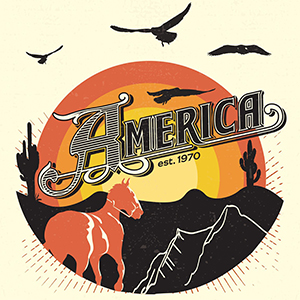 Can you think of any other unexpected aspects of America?
Can you think of any other unexpected aspects of America?
Bunnell: [Laughs]. It’s always shocking to realize how far your music gets in the world. We’ve been a band that’s toured internationally for all these decades. We played all over the place: Israel, Morocco, India, Australia, Japan, Korea. We’ve been everywhere [and had] many tours of Italy, Europe, New Zealand, Australia, Thailand. That’s kind of a shock to me. We’ve done a lot of shows in South America. We’ve played in Columbia, Ecuador, Peru, a tour of Chile and you realize how far these songs get. I remember when we first started going to South America. I said, “wait a minute. We haven’t sold any records there! How can a promoter be booking us to play a show in Ecuador?” Then we went to Ecuador and we were playing a bull rink. There’s people singing, and swaying and they know all the words. Well, the answer is because of bootlegging. All our music made it to all these places, even if the record sales didn’t reflect that, because of bootlegging, so that was an eye opener. I mean we played Moscow, you name it. It’s incredible how far music reaches around the world!
America performs at the Genesee Theatre on Saturday, February 12. For additional details, visit VenturaHighway.com and GeneseeTheatre.com.


